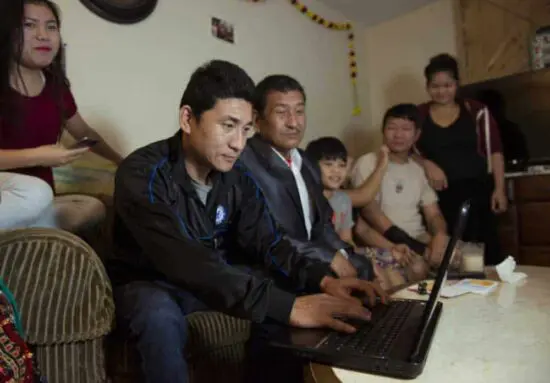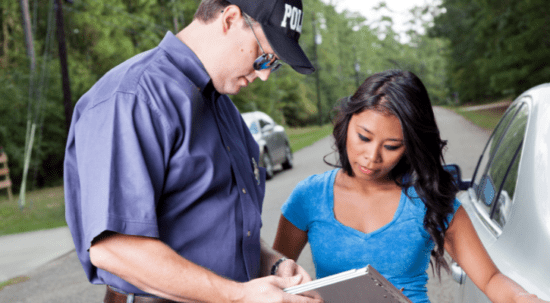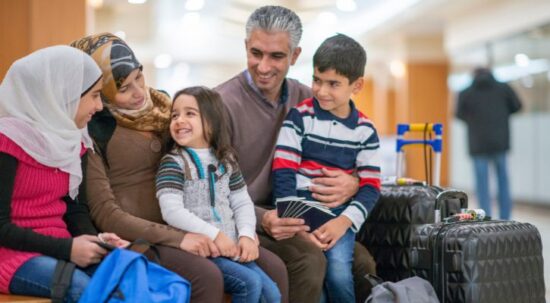What is social media?
Social media includes apps and websites where you connect with people you know or do not know, such as Facebook, Twitter (now called X), Snapchat, Instagram, TikTok, and WhatsApp. LinkedIn is another social networking site used for jobs and careers. Even YouTube, Reddit, and Discord count as social media because anyone can post videos and comments.
Social media has many benefits for immigrants, such as:
- Stay in touch with family and friends from your home country
- Stay connected to your culture through groups
- Learn about your new community and find local resources
- Find job opportunities, educational content, and language resources
10 ways to protect yourself online
These tips can help protect you from scams and surveillance, especially for people without legal status.
1. Use strong and unique passwords
Create strong passwords for each account. This means making them long and using a mix of letters, numbers, and symbols.
Turn on two-factor authentication for extra security. It adds another step when you log in, like a code sent to your phone.
Use a password manager like 1Password or LastPass to create and save strong passwords.
2. Adjust privacy settings and think before you post
Check your privacy settings often to control who can see your posts. Make all your accounts private. Be careful what you share on social media. Do not post personal details or pictures that could be misused.
If you are submitting an immigration application, the government is increasing social media screenings. You may be required to share your social media handles.
USCIS officers may look for content that:
- Is “anti-American” or “anti-Semitic”
- Raises security or ethical concerns
- Differs from what you claim in your application
Be aware that DHS already reviews public social media engagement by some non-citizens, including permanent residents, which could have an impact on your current immigration status.
If you are traveling outside the U.S., CBP can search your phone and laptop during security checks. Learn how to plan your travel safely, especially if you are not a U.S. citizen.
3. Protect your personal information and data
Personal information online is called data. Avoid sharing important data like your ID number, bank details, passwords, address, or immigration related documents online.
Be careful when giving apps access to your data, especially on Facebook. Regularly check and update your settings to control what apps can access. Consider deleting old accounts you no longer use. Use encrypted messaging apps like the latest version of WhatsApp and Signal for sensitive conversations.
Never send money to anyone unless you are sure who they are. Government offices and real businesses will not ask for money or your password.
4. Be cautious with friend requests from strangers
Only accept friend requests from people you know. Fake accounts can be used for scams to steal your personal information and money. If you meet someone online and want to meet them in person, do it in a public place with other people around.
Immigrants may be targeted by unkind people on social media. Block anyone who posts threats. Do not respond to them. Do not reply to hateful or racist accounts. They may try to scare you or share your personal information online.
- Learn more about what to do if someone is threatening you.
5. Limit location sharing
Avoid posting your real-time location publicly, like when you check into a place. Sharing your location in real-time can let others know where you are and may put your safety at risk.
Some apps, like Google Maps, may keep tracking your location even after you stop using them. Check your settings and turn off location tracking.
6. Avoid clicking suspicious links
Do not click on links from unknown sources. They could be scams or contain viruses that harm your device. Viruses can give people access to your personal information, money, or identity.
Remember, any offer that seems too good to be true usually is!
7. Monitor for unusual activity
Check your social media accounts for unusual activity, like unknown logins or strange posts. Report anything suspicious.

Know how to protect yourself from notarios and fake websites. Learn what to do if you have been a victim of fraud.
8. Keep your children safe
Even if you do not use social media, it is important to learn enough to keep your children safe. Experts recommend limiting social media use, watching what your children see and do online, and talking to them about their social media use.
Online bullying, called cyberbullying, is also a problem for young people. It can include mean comments, threats, or spreading lies about someone. Find help dealing with cyberbullying.
9. Do not believe everything you see online
Social media can spread false information. Some accounts post lies or scams to steal your personal information or money.
There are two common types of false information:
- Misinformation: False information shared by mistake
- Disinformation: False information shared on purpose, often to create strong emotions and mislead people.
Be cautious of information that seems extreme or one-sided, as it may try to look like it is from official websites or news outlets. Always check the information with trusted sources like government websites or well-known news outlets. If you are unsure where information came from, do not share it to avoid spreading false information.
10. Be careful with social media overuse
Social media platforms are designed to keep you online. Spending too much time scrolling can hurt your mental health and productivity. Set time limits to balance your time online and offline.
If you are joining a protest or community action, Justice Futures Law shares extra safety steps to help protect yourself and others.
More from USAHello
Looking for specific information?
We aim to offer easy to understand information that is updated regularly. This information is not legal advice.




